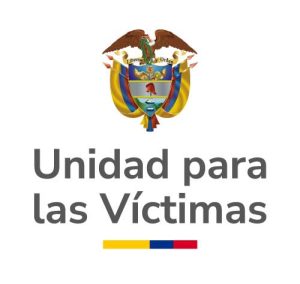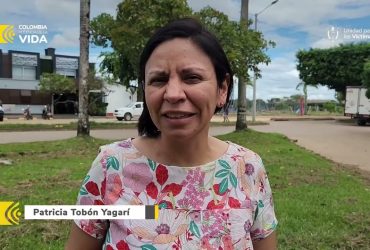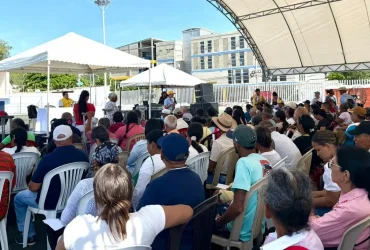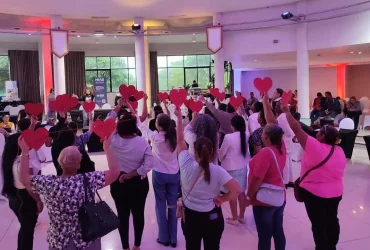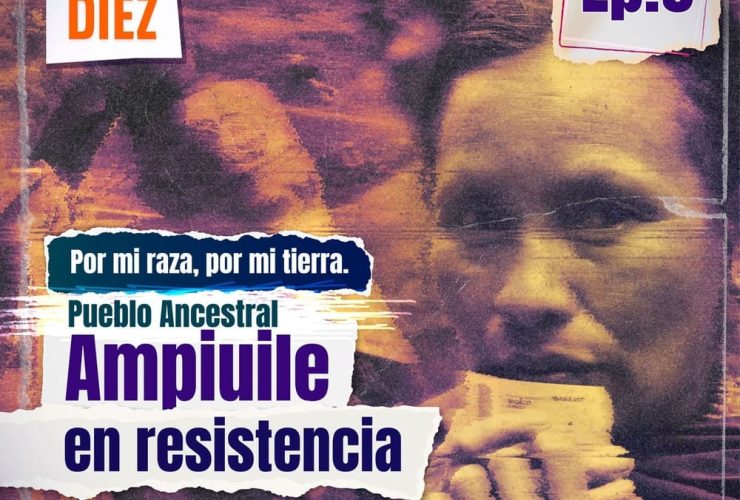By Cesar A. Marin C.
Gloria Esperanza Medina was born in La Romelia, El Tambo (Cauca), in 1968. La Romelia is an hour and a half by car from El Tambo, and two and a half hours from Popayan. She is the fourth of eleven siblings and has an adult son.
She lived there until she was 15 years old; she also studied primary school there. Along with her siblings, she went to a school where, on summer nights, the capital of Cauca could be seen from. “We used to light fires at night in that place, we told stories. We were a very well-known family in La Romelia,” Gloria recalls.
In 1984, the Eighth Front of the FARC interrupted the area’s peace and her father decided to send her to some uncle´s house in Popayan. The rest of her siblings remained in the village.
“One of my cousins had just gotten married, she moved to Cali and she asked me to join her, she said she would help me so I could keep studying while I helped her taking care of her baby. I studied until ninth grade because I had a health problem and I was forced to return to La Romelia,” she says.
When she returned, the public order situation was more complicated. The presence of the guerrillas in the town was more evident and their actions grew stronger. Two of her brothers were recruited by force.
The first one was Liver Javier, at the age of 17. Given this situation, her father made some negotiations with the authorities and the guerrillas without any results. Two years later, her brother was hurt in combat and, although he spent two months convalescing, he was left with physical consequences; these were the reasons of rejection in the ranks, so they ended up returning him to the family.
Later, the group recruited her 16-year-old brother, Milder. “My father went back to do proceedings with the authorities and the guerrillas, and he managed to get them to return my brother two weeks later,” says Gloria.
The horror night
By 1990, Gloria organized her romantic life with her current husband, and she had a two-year-old son. On August 13th, most of her family were in Popayan while Gloria was recovering from a c-section: she had lost a baby three weeks earlier. None of that mattered. That night, members of the FARC’s Eighth Front entered the house and assaulted her sexually.
From that terrible night, she clearly remembers: “The dogs began to bark from 8 pm. Back then, there wasn’t any electricity in the town. We were in the dark with my sisters and my child, and we heard noises outside the house. Finally, the aggressors practically knocked down the kitchen door and entered the house. They raped me. I managed to hide my sisters and my son in the room.”
They took cigarettes, liquor, canned goods, and money from a store her father had in the house. They warned her they would end her family if she told anything about what happened.
Gloria’s life changed forever. “It’s a degrading thing and one ends up thinking about suicide,” she says sadly. To those physical and emotional wounds, new pains were soon added.
Her family arrived from Popayan the next day. Her brother Liver Javier, who knew how some members of the armed group carried themselves, asked if they had raped her. She denied it. “Are you sure they didn’t do anything to you guys, they just stole the store?” he asked. She feared the outcome if she admitted it. “Just the theft,” she said.
Cruelty against her family
Four days later, members of the FARC took Liver Javier off the bus where he worked as an assistant, on the route between Popayan and La Romelia, and killed him right there. He never knew the truth of what happened to her sister on that August 13th.
As if the tragedy didn’t want to get away from the family, in November of that year the guerrillas murdered her father, Andres Medina; this happened when he was riding a motorcycle to a place known as La Cordillera. Gloria, who always kept silent about her sexual assault, still wonders why they killed them.
By 2000, her mother and siblings were living as displaced population in Popayan when her other brother who had been recruited years ago, Milder, was found dead along with two other people on the road that connects the city with El Bordo municipality.
Those events made her question her faith in God. “I have always been a believer, but there was a time when I fought with God, because I questioned why he had allowed so many horror and violent acts to happen against my family,” she recalls.
Even with financial difficulties, Gloria tried to rebuild her life with her husband and son. She got a job in the Cali’s Archdiocese cleaning La Hermita and Santo Domingo churches. “I was only earning half a minimum wage, but I was able to pay college for my son with that, who graduated from electronic engineering.”
Then she returned to Popayan, and at the same time, she learned she could finish high school through a foundation. She also met a psychologist in that place, who encouraged several women to organize. It was 2015, the peace process was being forged and the time to talk about what had happened was at hand. Gloria, who had never told anyone what she had suffered, thought: “If the guerrillas are going to receive benefits from the Agreement, then we, the victims, should too.”
She finished high school, studied some gastronomy, and reconciled with God. “Practically, I didn’t enjoy my son’s life, only since the recent five or six years. I was haunted by what had happened to me and my family. Now, I’m a completely different person from who I was before 2015. I didn’t speak, I felt no one else had experienced the bad things that had happened to me and, in a way, I was happy when I heard news about guerrilla deaths in combat. I told myself: ‘I hope they kill them all.’” Resentment leaves deep tracks.
“It is stirred inside, it bleeds, but it heals”
A while later, several victims, including Gloria, were invited by the Popayan Women’s Secretariat and an international cooperation organization to participate in the emotional recovery strategy being carried out by the Unit for the Victims and the International Organization for the Migrations “In total, there were about ten meetings. Psychosocial professionals helped us a lot emotionally. We blew off steam and ended up telling what we had inside choking us.”
“At that time, we were 23 women who attended these therapies, which helped us a lot to remove the hatred and resentment that we carried inside. I mean, it was like something stirred inside, it bleeds, but it heals.”
In 2020, Gloria took part in the Vivificarte strategy, an emotional therapy carried out by the Unit for the Victims for sexual violence survivors. “The experience was very good, we must reinforce all those learned steps so as not to fall back into that depression and guilt state, because one of the factors that prevents one from forgiving is not being able to heal. Hate ends up hurting, and thanks to these strategies and therapies, we have learned to heal and forgive through singing, art and listening to each other. One must decide between remaining a quiet, bitter and resentful person, or being an empowered person with self-love.”
Along with other armed conflict women victims, she created the organization Tamboreras del Cauca (Cauca’s Women Drummers), of which Gloria is its legal representative. “Through the drums that we build with our own hands, the music and the healing song, we have managed to mitigate, in part, the psychological impact.” From there they also advocate and manage projects for the victims, providing them with support and aid to the extent of their possibilities.
She understands that there’s not even a second of those events that can be changed from the past, but the present can be changed. “That is why we are committed to a public policy for prevention of gender and sexual violence against children and teenagers.”
Today, Gloria makes a living selling lunches, she has accomplished overcoming what happened to her, she is always well aware of the Tamboreras del Cauca activities, and in other women and percussion, she has found the strength and courage that the war couldn’t take away from her.

